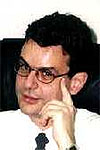and spent six years, on and off, studying the Wikipedia)
It is a question of time before the Wikipedia self-destructs and implodes. It poses such low barriers to entry (anyone can edit any number of its articles) that it is already attracting masses of teenagers as "contributors" and "editors", not to mention the less savory flotsam and jetsam of cyber-life. People who are regularly excluded or at least moderated in every other Internet community are welcomed, no questions asked, by this wannabe self-styled "encyclopedia"
Six cardinal (and, in the long-term, deadly) sins plague this online venture. What unites and underlies all its deficiencies is simple: Wikipedia dissembles about what it is and how it operates. It is a self-righteous confabulation and its success in deceiving the many attests not only to the gullibility of the vast majority of Netizens but to the PR savvy of its sleek and slick operators.
The overwhelming majority of contributors to and editors of the Wikipedia remain anonymous throughout the process. Anyone can register and members' screen-names (handles) mean nothing and lead nowhere. Thus, no one is forced to take responsibility for what he or she adds to the "encyclopedia" or subtracts from it. This amounts to an impenetrable smokescreen: identities can rarely be established and evading the legal consequences of one's actions or omissions is easy.
Everything in the Wikipedia can be and frequently is edited, re-written and erased and this includes the talk pages and even, to my utter amazement, the history pages! In other words, one cannot gain an impartial view of the editorial process by sifting through the talk and history pages of articles (most of which are typically monopolized by fiercely territorial "editors"). History, not unlike in certain authoritarian regimes, is being constantly re-jigged on the Wikipedia!
2. The Wikipedia is anarchic, not democratic
The Wikipedia is not an experiment in online democracy, but a form of pernicious anarchy. It espouses two misconceptions: (a) That chaos can and does lead to the generation of artifacts with lasting value and (b) That knowledge is an emergent, mass phenomenon. But The Wikipedia is not conducive to the unfettered exchange of information and opinion that is a prerequisite to both (a) and (b). It is a war zone where many fear to tread. the Wikipedia is a negative filter (see the next point).
3. The Might is Right Editorial Principle
Lacking quality control by design, the Wikipedia rewards quantity. The more one posts and interacts with others, the higher one's status, both informal and official. In the Wikipedia planet, authority is a function of the number of edits, no matter how frivolous. The more aggressive (even violent) a member is; the more prone to flame, bully, and harass; the more inclined to form coalitions with like-minded trolls; the less of a life he or she has outside the Wikipedia, the more they are likely to end up being administrators.
The result is erratic editing. Many entries are completely re-written (not to say vandalized) with the arrival of new kids on the Wikipedia block. Contrary to advertently-fostered impressions, the Wikipedia is not a cumulative process. Its text goes through dizzyingly rapid and oft-repeated cycles of destruction and the initial contributions are at times far deeper and more comprehensive than later, "edited", editions of same.
Wikipedia is misrepresented as an open source endeavor. Nothing can be further from the truth. Open source efforts, such as Linux, involve a group of last-instance decision-makers that coordinate, vet, and cull the flow of suggestions, improvements, criticism, and offers from the public. Open source communities are hierarchical, not stochastic.
Moreover, it is far easier to evaluate the quality of a given snippet of software code than it is to judge the truth-content of an edit to an article, especially if it deals with "soft" and "fuzzy" topics, which involve the weighing of opinions and the well-informed exercise of value judgments.
4. Wikipedia is against real knowledge
The Wikipedia's ethos is malignantly anti-elitist. Experts are scorned and rebuffed, attacked, and abused with official sanction and blessing. Since everyone is assumed to be equally qualified to edit and contribute, no one is entitled to a privileged position by virtue of scholarship, academic credentials, or even life experience.
(Note: You can view every article as one long page if you sign up as an Advocate Member, or higher).




